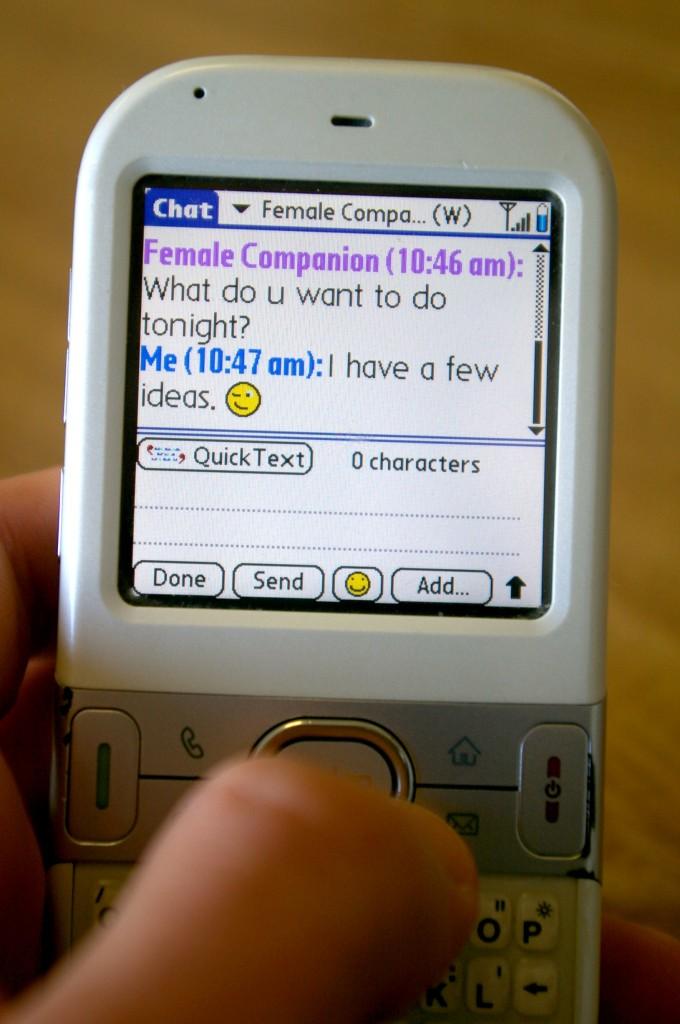No Such Thing as Safe Sext: The Dangers of Racy Texts
July 9, 2011
Published: April 15, 2010
I can remember being a little girl and absolutely loving the song “Computer Love” by Roger and Zapp. Although I didn’t really understand the concept of the song and was probably just in love with the cool-sounding auto-tune, the concept of love through technology is just as common as face-to-face interaction. It should come as no surprise then, that in a day and age where e-mail has virtually replaced snail mail and text messaging equates to having a conversation, we have not only learned to express our emotional needs through technology, but our physical needs as well. How, you may ask? Through sexting, of course!

Sexting is the new phenomenon of sending and receiving sexually charged messages through text. Not only are people sending the “I luv u” and the “C U L8R” text messages, but also the much more racy ones that range from a simple tease to full-out gratuitous descriptions. The normalcy of such intimate interaction through technology really makes one wonder if this generation truly regards sex as intimate. Of course, for those engaged in long-distance relationships, technological affection is the only affection for long periods of time (granted fidelity is in play). For couples that find themselves in that situation, a little “What are you wearing?” can go a long way. For regular relationships, these kinds of messages can help to build anticipation for a later rendezvous, but there is also the possibility that one’s messages are better than the real thing; trust me, not everyone lives up to their textpectaions. I knew of a girl who suddenly became unavailable after a series of enticing texts led her new beau to send a picture of his (apparently disappointing) naked body.
To me personally, however, the sheer possibility that some technologically advanced brainiac could somehow find all of my sent text messages, or the more realistic possibility that I might goof up and send it to the wrong person, is enough for me to keep my texting G-rated. Think of the numerous celebrities who, during the course of their careers, have been publicly embarrassed when something they intended to be private suddenly became public. Along with the possibility of the message being seen by an unintended party is the possibility that the person you may be so enamored with at the moment may one day hate you and have all of those very personal messages permanently stored on their Blackberry.
Case in point, during the ridiculous Tiger Woods frenzy, many women came forward with many claims about their relationships with the golf superstar. He tried his best to stay out of the public eye, downplay the allegations, and keep his wholesome image. Try as he might, he couldn’t shake the negative publicity surrounding him, particularly because the women he had slept with were eager to share all the details of their affairs with Woods. One woman in particular named Joslyn James dedicated an entire Web site to her relationship with Woods. Sextingjoslynjames.com displays all the messages that Woods sent James over the course of their relationship. Many of them were incredibly vulgar and downright disgusting. Interestingly enough, she chose to omit the messages that she had sent him. Wondering how to keep the same thing from happening to you? There’s an app for that. Tigertext is a brand new app developed for iPhone users that causes sent text messages to self-destruct from the phones of both the sender and the receiver within a set period of time. What will they think of next?
As a generation raised during the technological era, it’s natural that we express ourselves in different ways than our parents did. What’s important, however, is that we recognize the limitations of such technology, most notably the lack of privacy. As the saying goes, with great power comes great responsibility, and at the end of the day, we are completely responsible for everything we send through a text or e-mail, and definitely what we post on the Internet. Always remember to practice safe text.









